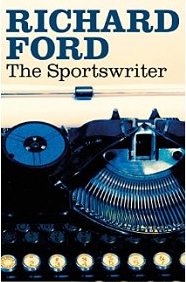
I first read The Sportswriter—the opening salvo in Richard Ford’s series of novels about Frank Bascombe—when I was 22 years old. People often say they come to love fictional characters because they can identify with their plight. Frank’s struggles are remote from my experience: marriage, divorce. The birth of three children. The death of the oldest. That I fell in love with the book, returning to it more than a dozen times, speaks instead to the great power of Frank’s internal longing and his hunt to redefine himself in a new period of life.
As in the case of its literary forerunner, Walker Percy’s The Moviegoer, the book’s title is terribly misleading. Ford devotes little time to Frank’s actual occupation, one he took up only after putting aside after a brief life as a fiction writer. Instead, we see a man stumbling as a single father in suburban New Jersey, struggling with a new girlfriend and his job, while still in love with his ex-wife. He desperately wants to move beyond his past, but must first confront his perilous present. His struggle to do so makes him a great avatar of modern American existence: someone mired in the moment and trying to make the best of things.
The power of The Sportswriter is rooted in Ford’s skillful depiction of Frank’s interior life. Whether speaking about his protagonist’s decision to put aside his novel or about his divorce or the life he once lived and lost, Ford is willing to explore what it all means, not only for Frank, but for us.
In three subsequent books (most notably Independence Day, the first novel to win both the Pulitzer Prize and the PEN/Faulkner Award), we see Frank become a real estate agent and remarry, cope with cancer, and take on years that Ford labels the “Existence” and “Permanent” periods. I’m fond of these books, too, but perhaps because The Sportswriter was the first I encountered or maybe because I came to it so young, it’s the one I return to most often. When I’m looking to reach for something bigger, something universal in my own writing, I sometimes read aloud its illuminative passages, forever finding inspiration in its stellar, earth-shaking sentences.
There are those who describe Frank as an everyman. Maybe so. But for me, he stands alone.

